Tehran’s Relations With Neighbors Not Tied To JCPOA Or US Permission – Foreign Ministry
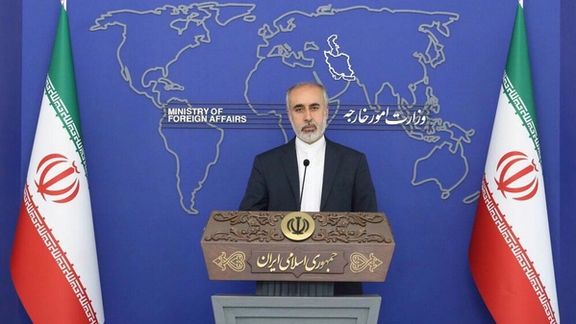
Iran says its relations with neighbors are not tied to the revival of the 2015 nuclear agreement (JCPOA) or permission from the United States.

Iran says its relations with neighbors are not tied to the revival of the 2015 nuclear agreement (JCPOA) or permission from the United States.
Foreign ministry spokesperson Nasser Kanaani tweeted on Friday in English that the “false dichotomy between JCPOA, of which Iran unlike US remains a party, and good ties between Iran and its neighbors, including Russia, doesn't hide the fact that indecision of the unfaithful US is the main hurdle for a deal.”
He added, “Our neighborly policy is not contingent on JCPOA or US permission.”
Kanaani made the comments in reaction to remarks by US Special Envoy for Iran Robert Malley who said Iran either agrees to return to the nuclear deal and mend its relations with the world or stick to Russia and become more isolated.
Following a trip to Tehran by Russian President Vladimir Putin this week, Malley, said on July 19 that Iran "can opt for a position of relative dependency on Russia ... or it can choose to come back into the deal that’s been negotiated."
Echoing the comment, State Department Spokesperson Ned Price said on July 20 that Iran has a choice; siding with Russia, or choosing the path of diplomacy and taking up the deal that has been on the table for some time now, to have an economic relationship with other countries around the world.
On July 21, Foreign Minister Hossein Amir-Abdollahian said Iran is making efforts to strengthen relations with its Persian Gulf neighbors, UAE and Kuwait, noting that both countries will be sending their envoys to Tehran soon.
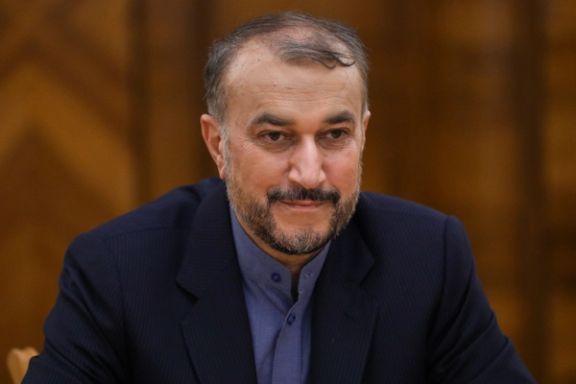
Iran's foreign minister says Saudi Arabia has shown readiness to advance the bilateral talks from security issues to the political phase.
In an interview broadcast on state television Thursday evening, Hossein Amir-Abdollahian said, "Last week we received a message from Iraqi foreign minister [Fuad Hussein] saying that the Saudi side is ready to move the talks from a security phase to a political and public one.”
"We also expressed our readiness to continue talks at the political level so that it leads to the return of Iran-Saudi Arabia ties to the normal level," he added.
Late in June, Iraqi Prime Minister Mustafa al-Kadhimi traveled to Iran and met with President Ebrahim Raisi after a visit to Saudi Arabia and meeting with the kingdom’s de facto ruler Crown Prince Mohammed bin Salman aimed at jumpstarting stalled talks between Tehran and Riyadh.
Iran and Saudi Arabia -- which are locked in proxy conflicts around the region -- have held several rounds of talks mediated by Baghdad since 2021. In April, they finally held the much-anticipated fifth round of negotiations, saying that a clear outlook was reached for the resumption of regular talks.
However, it was the Islamic Republic that suspended the talks earlier in April a day after Saudi Arabia announced it had beheaded 81 men, for “heinous crimes.” Forty-one were Saudi Shiites, Human Rights Watch reported, apparently convicted over protests.
Saudi Arabia cut ties with Iran in 2016 when mobs attacked its embassy in Tehran after Riyadh executed 47 dissidents including the leading Shiite cleric Sheikh Nimr al-Nimr.
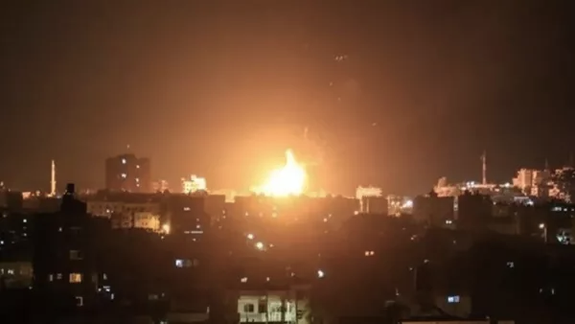
The top US Air Force general in the Middle East warned of increasing attacks by Iran-backed militias against the United States and its allies as tensions rise in the region.
As he stepped into his new role -- with responsibility for military operations in Iraq, Syria, Afghanistan, and across the region, Lt. Gen. Alexus Grynkewich told reporters at al-Udeid Air Base in Qatar on Thursday that such assaults could lead to a new escalation, while Russia and China are vying for economic and military influence across the Mideast.
“We’re in this position where we’re not under attack constantly, but we do see planning for attacks ongoing. Something will occur that unleashes that planning and that preparation against us,” Grynkewich said.
He also expressed concerns about Iran preparing to send Russia armed and unarmed drones to use in its war on Ukraine, saying it “is not a surprise … but it’s concerning.”
He also referred to Tehran’s rapidly growing stockpile of near-weapons-grade nuclear fuel in recent months, saying, “Everyone in the region is very concerned.”
His remarks came as the Syrian defense ministry said an Israeli strike killed three Syrian soldiers and wounded seven others near Damascus early Friday.
According to The Syrian Observatory for Human Rights war monitor the attack targeted an "Iranian weapons depot", an air force intelligence facility and a high-ranking officer's office, as well as a car near the Mezzeh military airport.
It said three Syrians were killed in military positions hosting air defense batteries in the perimeter of the Mezzeh airbase, as well as three non-Syrians and two “collaborators” of the Iran-backed Lebanese Hezbollah group at a workshop for manufacturing Iranian drones near the town of Sayyidah Zaynab, commonly known as Sitt Zaynab, 10 kilometers south of Damascus.
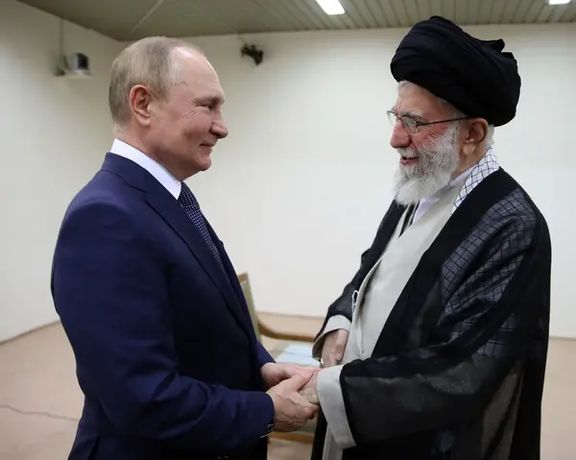
Iranian Supreme Leader’s endorsement of the Russian invasion of Ukraine is not surprising, Speaker of the US House of Representative Nancy Pelosi said Thursday.
Asked by Iran International correspondent Arash Aalaei about Islamic Republic’s ruler, Ali Khamenei praising Vladimir Putin’s “initiative” to invade Ukraine, Pelosi said, “Tyrants find their friends and there’s no surprise in any of that. I don’t think anybody has ever recognized Khamenei as a respecter of boundaries or people.”
During Putin’s trip to Tehran July 19, Khamenei lauded the Russian leader’s initiative in attacking Ukraine, saying that NATO would have launched a war sooner or later in Ukraine.
Pelosi added, “To me what Khamenei said was practically irrelevant, but what is relevant is the weapons he may supply Russia with.”
The United States has warned that Russia is preparing to receive Iranian military drones to use in Ukraine and has even sent teams to Iran to review its options. Iran has half-heartedly denied the accusation, but Khamenei’s strong endorsement of the invasion is a signal that Tehran would have little hesitation in supplying the drones.
Pelosi sounded resigned that Iran will cooperate with Russia. “It’s tyrant-to tyrant; doesn’t matter what any of us think; it’s what they will do,” she said.

Israel’s Mossad captured a senior IRGC official on Iranian soil and interrogated him about weapons shipments to Iran's proxies, Iran international has learned.
Iran International has obtained video footage of the interrogation in which a man introducing himself as Yadollah Khedmati, deputy commander of the Revolutionary Guards (IRGC) Logistics, says he regrets his involvement in shipping weapons to Iran’s proxy groups in Syria, Iraq, Lebanon, and Yemen and urges other IRGC officials to avoid engagement in such activities.
According to a source, Khedmati served as the deputy of Brigadier General Ali Asghar Nowrouzi, the IRGC’s Logistics commander who is known as a close associate of the former commander of the IRGC’s Qods Force, Ghasem Soleimani. Soleimani was assassinated by the US in Baghdad in January 2020.
Khedmati also tells his interrogators about Nowrouzi’s connections with Fars Air Qeshm cargo airline. The airline has been accused of transporting weapons for Hezbollah during the civil war in Syria.
The source who spoke to Iran International on condition of anonymity said Mossad agents had released Khedmati unharmed after the several-hour-long interrogation at an unspecified time and place.
Nowrouzi has been responsible for sending weapons to Iran’s proxy groups in the region including Syria as well as securing funds for the operations of the Qods Force through the IRGC’s Cooperatives Foundation of which he's a board member, the source claimed.
On June 14th Iran’s state-run television (IRIB) in a report showed several men in prison outfits claiming they were recruited by a Mossad agent who went by the alias Sirous to abduct Iranian officials and carry out assassinations on Iranian soil on behalf of the Mossad.
The report called these individuals “thugs and hooligans” and claimed they were involved in a wide range of criminal activities including human and weapons trafficking before being recruited by Israeli agents.
Sirous, the men said, contacted them through social media, prepared them for their future mission which ranged from arson to murdering humans, in online group sessions, and paid them in US dollars.
According to the Iranian TV report, the recruited “thugs and hooligans” abducted “a Jihadi official linked to the IRGC” and took him to a mud hut in a field in an unknown location in the suburbs of Tehran where they forced him “to make false confessions” on camera under threat and torture about things “not related to his specialized field of work”.
The report said the Mossad agent behind the abduction was also arrested by the IRGC's intelligence (SAS) with the help of the intelligence ministry.
This is the second time evidence emerges of Israeli agents detaining an IRGC operative inside Iran and taping confessions. A short audio recording was published by Israeli media in May with a photo of a man introduced as Iranian national Mansour Rasouli, 52. In the audio recording, Rasouli said he was sent to Turkey by the IRGC to establish an operational network to assassinate an Israeli diplomat in Istanbul, a Germany-based US general, and a journalist in France.
Israeli television channels including Channel 12 which broadcast the recording, without providing a source according to The Times of Israel, claimed the video was made by Mossad operatives posing as Iranian secret service at Rasouli's home in Tehran. Channel 12 news added, also without citing a source, that the Shin Bet security agency — which generally operates within Israel — also participated in the detention in Iran.
Iranian, Israeli, and Turkish officials never made any comments about the reports of the alleged assassination plots but a week after the original audio recording emerged, the man in the photo published by Israeli media released a denial video on social media, possibly recorded and released by Iranian intelligence, in which he said he had been coerced by his abductors to make false confessions.
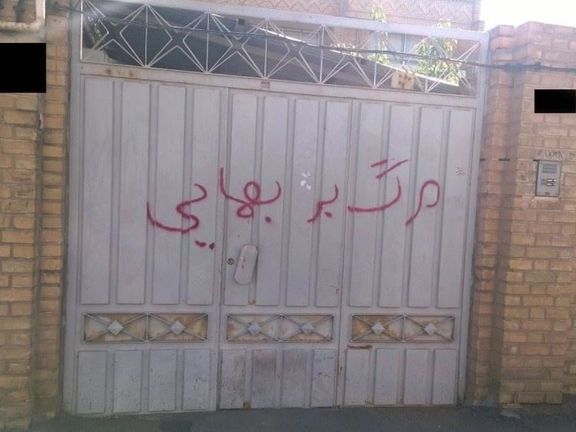
Followers of the Baha'i faith say the Islamic Republic has either arrested, summoned to court, put on trial or closed businesses of at least 20 Baha'i citizens just since the beginning of July.
The Worldwide Baha’i Community said in a statement published on July 20 that Tehran has intensified its systematic campaign to suppress the religious minority in recent weeks. The persecuted Baha’is in July were citizens of Shiraz, Tehran, Yazd and Bojnurd, it said.
According to the community, at least 44 Baha'is were detained, summoned to court, put on trial or given prison sentences, or had their homes searched in June.
Earlier in June, Radio Farda reported that 26 followers of the Baha'i faith, all of whom residing in the city of Shiraz in the southwestern province of Fars, were sentenced to 2-5 year in prison on charges of "conspiracy to disrupt internal and external security."
The 1979 constitution of the Islamic Republic recognizes only Islam, Christianity, Judaism and Zoroastrianism. Baha'ism, established as a new religion in Iran in 1863 by Baha'ullah, has always been deemed heretical by the Shia establishment and subject to intermittent bouts of political persecution.
Supreme Leader Ali Khamenei has on several occasions called the Baha'i faith a cult and in a religious fatwa in 2018 forbade contact, including business dealings, with followers of the faith.
Baha'is, who number around 300,000 in Iran, say their rights are systematically violated and they are often harassed, forced to leave their homes and businesses, and are deprived of government jobs and university education.